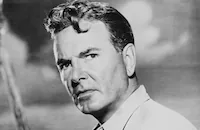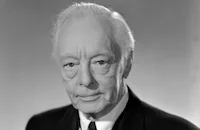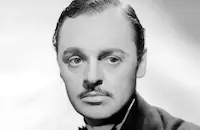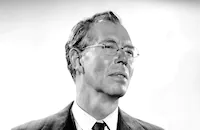Claudia and David

Brief Synopsis
Cast & Crew
Walter Lang
Dorothy Mcguire
Robert Young
Mary Astor
John Sutton
Gail Patrick
Film Details
Technical Specs

Synopsis
In New York City, Claudia Naughton collects her husband David from a construction site where he is the architect, and they drive back to their home in Connecticut. That evening, before keeping a dinner party engagement with David's sister Julia and her husband Hartley, Claudia checks on their child Bobby, who will celebrate his third birthday the next day. At the party, David is seated next to Elizabeth van Doren, a rich widow who is interested in hiring him to design a house and farm she wants to build locally. Later in the evening, as David is showing Elizabeth some rough sketches of what he might design, Claudia tells them that another guest, Brian O'Toole, is going to hold a séance. O'Toole receives messages from the "beyond" by handling objects given to him by guests. He tells Claudia that her mother is sending a message that David should not go on any trips as he will have an accident. Later, when Claudia becomes a little anxious about Bobby, dinner guest Phil Dexter offers to run her home for a quick look at him, annoying his wife Edith. On the way home, Phil explains the trickery used in O'Toole's presentation and reveals that he and his wife have recently lost a young son, and she now goes from phony medium to phony medium seeking solace. When Claudia arrives home, she finds Bobby unconscious with a temperature of 104 degrees. Servants Bertha and her husband Fritz have telephoned the doctor, and while they await his arrival, Phil and Bertha help Bobby through several convulsions. Dr. Harry pronounces Bobby out of danger, but when David arrives, he tells them that Bobby is probably going to have a case of the measles. Although Claudia and David thank Phil for all his help, David is upset about Phil bringing Claudia home, even though he has just returned from escorting Elizabeth home. The couple have a big fight but quickly make up. By the next morning, Bobby has a full-fledged case of the measles. Reacting to the message O'Toole gave her at the séance, Claudia tells David not to go to a convention of architects in Los Angeles, even though he has not been officially invited yet. While Julia is visiting, Claudia receives a bouquet of white roses, which she assumes are from David but are actually from Phil. Julia tells her that Phil is a fine man but that Edith has been quite hysterical since their son died and could have a complete breakdown. Later, while David is busy helping Elizabeth with plans for her farm, Phil brings a present for Bobby and invites Claudia for a drive. They stop at Elizabeth's place, and Claudia invites her to a dinner party the following week. David stays on to do more work with Elizabeth, which results in another big fight with Claudia. When Edith then pays a visit to Claudia and accuses her of seducing Phil, Claudia tries to assure her that there is nothing between them. Edith appears to be on the brink of a total breakdown but Claudia is able to calm her. That night, David returns very late but, to his astonishment, Claudia is very forgiving, having realized the relative good fortune she enjoys. A few days later, David receives the invitation to Los Angeles and asks his secretary to arrange for the airline reservations. He tells Claudia about the invitation but she is reluctant to leave Bobby and still does not want him to go. On the afternoon of Claudia's dinner party, David has a serious car accident and is taken to Dr. Harry's house. When Claudia arrives, the doctor informs her that David is alive but that he cannot assure her of anything more until David has had a full examination at the hospital. Claudia returns home to find that all her dinner guests have come to keep a vigil, and finally word comes that David will be all right. After David comes home from the hospital with a broken rib, Dr. Harry recommends a trip to California. When Claudia tries, without success, to book airline tickets, her fatalistic attitudes are reinforced. Later, O'Toole visits and reveals he knew nothing at all about David being in the hospital, and Claudia is finally convinced that he is a fraud. David then tells her that he already has the airline reservations, so the trip to California is on.

Director

Walter Lang
Cast

Dorothy Mcguire

Robert Young

Mary Astor

John Sutton

Gail Patrick

Rose Hobart

Harry Davenport

Florence Bates

Jerome Cowan
Else Janssen
Frank Twedell
Anthony Sydes

Pierre Watkin
Henry Mowbray
Clara Blandick
Eric Wilton
Frank Darien
Eve Novak
Jacqueline Warrington

Walter Baldwin
Crew
Lloyd Ahern
James Basevi
Bonnie Cashin
Vera Caspary
Frank Davis
Richard Day
Ruth Fox
Rose Franken
Bernard Freericks
Gaston Glass
Edwin Hammeras
Roger Heman
Albert Hogsett
Ernest Lansing
Joseph Lashelle
Thomas Little
William Brown Meloney
Cyril J. Mockridge
Paul Neal
Ben Nye
Maurice De Packh
William Perlberg
Edward Powell
Frances C. Richardson
Fred Sersen
Robert Simpson
Tess Slesinger
Edward Snyder
Herbert Spencer
Herb Taylor
J. O. Taylor
Darryl F. Zanuck

Film Details
Technical Specs

Articles
Claudia and David -
Claudia had established Dorothy McGuire as a new screen star. It was her film debut, but she had already played the character to great acclaim on Broadway in a production that ran 722 performances from 1941-1943. That production had been a tremendous break: David O. Selznick bought the film rights to the play, signed McGuire to a movie contract and brought her to Hollywood. A few months later, he sold the property to Twentieth Century-Fox and also agreed to share McGuire's contract with that studio. After Claudia became a significant screen hit, Fox and Selznick were eager for a sequel, but McGuire refused, resulting in a suspension.
The suspension was short-lived, and McGuire soon starred in three more successful, now-classic films: The Enchanted Cottage (1945), A Tree Grows in Brooklyn (1945) and The Spiral Staircase (1946). The Enchanted Cottage also starred Robert Young as McGuire's husband. They made a good pair, and once again there was pressure for a Claudia sequel. But McGuire was still resistant: she badly wanted a part in RKO's Till the End of Time (1946) instead. Selznick agreed to loan her out for that role if she would finally make Claudia and David, and she agreed.
Claudia had originated as a series of short stories by Rose Franken about the trials and tribulations of a young married couple, published in Redbook and Good Housekeeping. In 1939, Franken published Claudia: The Story of a Marriage, the first of eight Claudia novels. A radio adaptation soon followed, as well as the Broadway play, which Franken herself wrote and directed. As the author's New York Times obituary put it, "Miss Franken's works displayed a steadfast conviction that marriage was a compound of gaiety and disaster, in which the partners matured as the result of shared experience. A woman, moreover, through fortitude understanding and perspective, could make marriage a happy estate. Although the notion of divorce might be entertained, it was not a viable alternative."
Claudia and David was directed by Walter Lang. Filming was briefly interrupted a week into production when Lang's mother died and he flew to Tennessee for her funeral -an extra-poignant occurrence since there are several references in the film to the death (in the first film) of Claudia's mother.
This was actor John Sutton's first film after two years in the Navy. Mary Astor makes an appearance on loan from MGM after having just played mothers in Thousands Cheer (1943) and Meet Me in St. Louis (1944), and she was happy for the change of pace. As she later wrote in her memoir A Life on Film: "I loved it. I wasn't anybody's mother and I looked lovely in beautiful clothes."
The film was not as big a phenomenon as the original Claudia, but it was well-received. The New York Times called it "a pleasant and touching picture in a strictly romantic vein... Walter Lang's capable direction has brought out the best in actors and script."
Variety pronounced it "one of those pictures that will have the women flocking to the box office. And gals' escorts won't have any special reason to complain... 78 minutes of solid entertainment... The picture has been given deluxe production throughout, with sets and technical details all of top quality."
According to an article of the day in The Hollywood Reporter, plans for a third Claudia film were squelched when it proved too difficult to fit into the schedules of both Dorothy McGuire and Robert Young.
By Jeremy Arnold

Claudia and David -
Quotes
Trivia
Notes
Although Hollywood Reporter production charts place Roy Roberts in the cast, his appearance in the released film has not been confirmed. This film is a sequel to the 1943 Twentieth Century-Fox picture Claudia, which was also produced by William Perlberg and starred Dorothy McGuire and Robert Young in the leading roles. According to Hollywood Reporter news items, Edmund Goulding, the director of Claudia, was originally scheduled to direct the sequel, for which Young was borrowed from M-G-M. Although Twentieth Century-Fox had planned to produce a third film based on Rose Franken's "Claudia" and "David" characters, according to a August 16, 1946 Hollywood Reporter news item, that picture was not made due to the difficulties in "simultaneously obtaining" the services of Young and McGuire.














